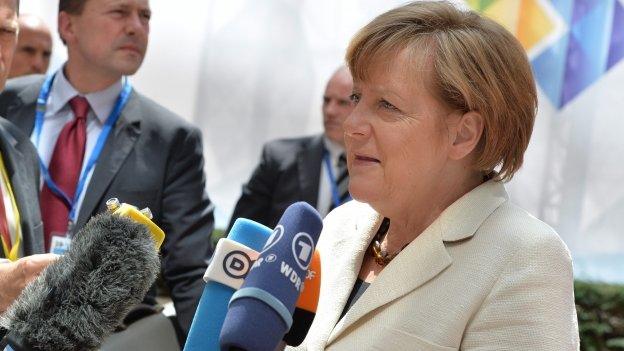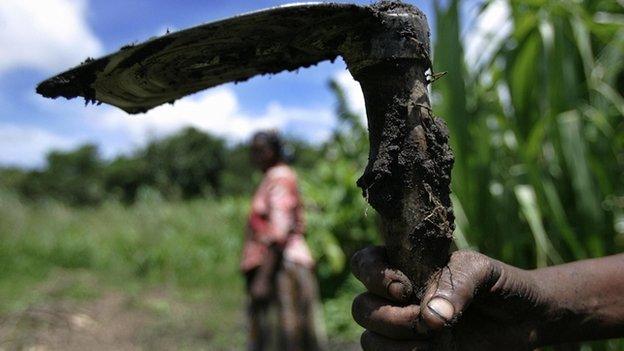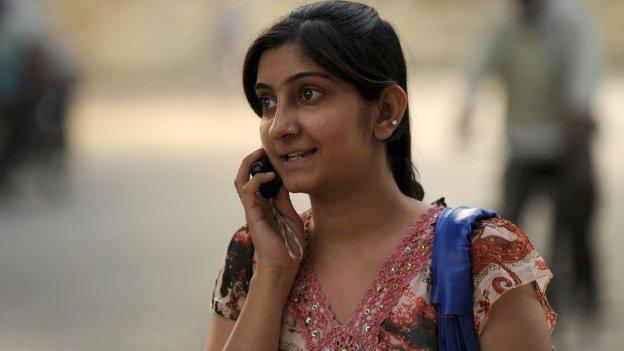Push to give women more workplace clout
- Published

Many girls fail to get a place at primary school
When German Chancellor Angela Merkel set out her plans for more vocational training for women in the developing world, at this week's G7 summit of economic powers, she was preaching to the converted.
US President Barack Obama has said it himself: "When women succeed, nations are more safe, more secure and more prosperous."
That rather neatly sums up a realisation that has gradually dawned on the development community in the past 10 years: that focusing policies on women and girls benefits not only them, but also whole countries and even the world.
It has always made sense to focus on women, simply because they are disproportionately affected by global poverty, conflict and corruption.
Two-thirds of the world's illiterate people are women.
The original Millennium Development Goals, external made girls' education and maternal health two of the main priorities.
Big strides have been made in both areas since 2000 - though it is worth remembering there are still as many girls out of primary school in Ethiopia as there are in primary school in Britain.
Now we are moving into a different phase, where policy-makers are turning their attention to another agenda beyond schooling - how to empower women economically.

Angela Merkel set out plans for vocational training
The Organisation for Economic Co-operation and Development (OECD), external believes that if workforce participation between men and women were more equal, worldwide gross domestic product (GDP) would leap by 12% by 2030.
That's why other powerful women are joining in Mrs Merkel's call to close the workforce gender gap.
They include:
International Monetary Fund (IMF) managing director Christine Lagarde
Liberian President Ellen Johnson Sirleaf
philanthropist Melinda Gates
US presidential hopeful Hillary Clinton
Facebook chief operating officer Sheryl Sandberg
Insecure jobs
This isn't just about the fact that women tend to earn less than men across the world - a theme that has resonance in richer countries.
It's also that women are more likely to be in insecure jobs, making them more vulnerable to economic shocks.

Many women lack legal rights to land they cultivate
They might face tougher legal barriers too - laws in more than 100 countries still curtail women's roles in the economy.
In sub-Saharan Africa women farmers make up nearly half the agricultural workforce, yet in many states they still lack basic legal rights to the land they cultivate.
Following the genocide there, in 1994, Rwanda decided to change its laws to allow women to inherit land just as men do.
Many Rwandan women now hold property in joint land titles with men - so they have a formal stake in how that land is used.
Experts say these policies have had a transformational effect in letting women thrive economically and helping them to pull their families out of poverty.
The World Bank believes that if the gender gap in agriculture across the world was closed, the number of people who go hungry could be reduced by 100-150 million.
Technology will also be key in bringing more women into the workforce and unleashing their full potential.
At the moment, a woman is 21% less likely to own a mobile phone than a man (in Africa it's 23%; in the Middle East it's 24% and in South Asia it's 37%).

Access to a mobile phone can make a big difference
This matters because countries such as Kenya - with its M-PESA system - have a good story to tell about the revolutionary power of mobile phone banking.
If more women own phones in the coming years, it stands to reason that more of them will be able to start their own businesses or learn about market prices.
Putting women in greater control of household finances has a virtuous knock-on effect too, as they are on the whole better than men at investing money in their family's education and healthcare.
That's why the UN development goals, external for the next 15 years specifically look at the need to improve women's access to the internet and new methods of communication.

Women in least developed countries:
Women in Sierra Leone are 183 times more likely to die in childbirth than those in Switzerland
Secondary school enrolment for girls is 26.8% in developing nations, compared with 80.2% in richer countries
On average, in developing nations, the rate of literacy among women is two-thirds the rate among men. In richer countries, it is 94.8%
Some 86.2% of working women in developing nations are in jobs without a secure future
Source: Poverty is Sexist report

There are other encouraging signs of change.
The World Economic Forum calculates that in the past decade alone, seven million women have joined the labour force in Pakistan, along with another seven million in Bangladesh.
Recent data also suggests women entrepreneurs are on the rise in emerging economies such as Nigeria and Ecuador.
Rising aspirations
Much of this is to do with changing attitudes.
As girls' education has become more of an accepted part of family life, women themselves are becoming more aspirational - wanting to make proper use of their skills.
Their families, too, want to see an economic return on the education they've invested in.
And yet for all the G7 talk of empowering women and "fostering female entrepreneurship", it still means very little in some of the world's poorest communities.
In its recent report Poverty is Sexist, external, the campaign group One says that every day 39,000 girls across the world become child brides, depriving them of the education that could make them the businesswomen - and political leaders - of the future.